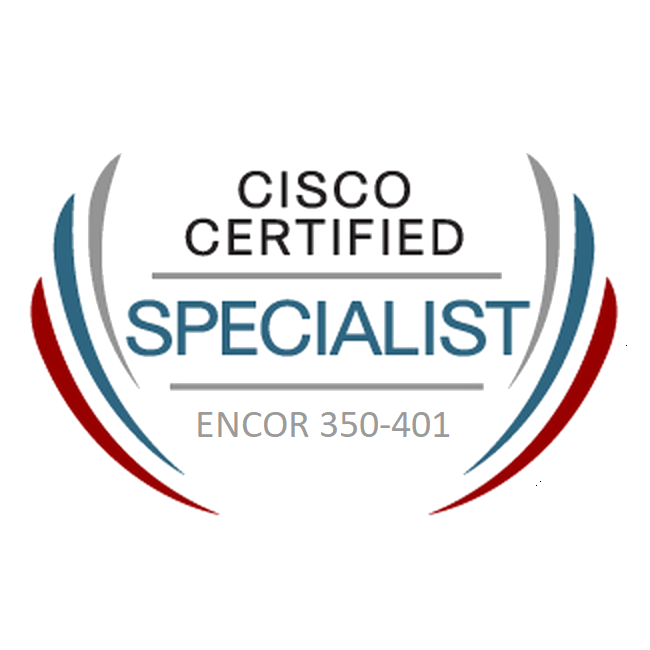
Implementing Cisco Enterprise Network CoreTechnologies (350-401 ENCOR) course is designed to prepare for the exam (ENCOR 350-401) which is associated with the CCNP and CCIE Enterprise Certifications. In this training class, you will gain the knowledge of implementing core enterprise network technologies including dual stack (IPv4 and IPv6) architecture, virtualization, infrastructure, network assurance, security and automation. It serves as the prerequisite exam for the CCIE Enterprise Infrastructure certification.
Training is available in small groups as well as on one-to-one basis. Get in touch.
Implementing Cisco Enterprise Network CoreTechnologies (350-401 ENCOR) course is designed to prepare for the exam (ENCOR 350-401) which is associated with the CCNP and CCIE Enterprise Certifications. In this training class, you will gain the knowledge of implementing core enterprise network technologies including dual stack (IPv4 and IPv6) architecture, virtualization, infrastructure, network assurance, security and automation. It serves as the prerequisite exam for the CCIE Enterprise Infrastructur ecertification.
40 Hours
It is highly recommended that candidate should have a sound understanding of CCNA before taking this course.
After completion of the course you can apply for the following job positions:
BlueMap has dedicated servers for PaaS, with 99.9% uptime. Candidates will be provided access to individual pods for lab practice. Guidance will also be provided if candidates want to setup a lab environment on their personal machines. A lab guide will be provided to each candidate with scenarios to practice all modules covered in the course because at BlueMap we believe that unless you see it happening you won’t be confident to answer any questions based on the same. There would be scenarios for implementing, verifying and troubleshooting all modules covered in the course.
After completion of this course you can appear for the following certification exams:
Cisco Enterprise Network Core Technologies v1.0 (ENCOR 350-401) is a120-minute exam associated with the CCNP and CCIE Enterprise Certifications. This exam tests a candidate’s knowledge of implementing core enterprise network technologies including dual stack(IPv4 and IPv6) architecture, virtualization, infrastructure, network assurance, security and automation. The course, Implementing CiscoEnterprise Network Core Technologies, helps candidates to prepare for this exam.
Classes will be conducted online via GoToMeeting.
You will be provided dedicated lab access on our 24x7 available cloud servers during the entire course duration. Each candidate will have his/her own lab scenario for practice. Moreover, if the candidate wants to setup a lab on their machine that support will also be provided by the instructor.
The candidate will be provided with daily class recordings, presentations, lab guides, virtual machines and study notes for practice. All this material will be included in the course fees.
We do not have a refund policy. The candidate will be provided first two sessions free of cost and then the candidate will be asked to pay the course fees.
Yes, the course fees can be paid in two instalments. The first instalment will be payable after the first two free sessions. The second instalment will be payable after 50% course completion.
Placement assistance will be provided to all candidates after course completion. Interview calls be provided to all candidates. Along with that mock interview sessions will also be conducted for all candidates to prepare them for the interview.
Even after the course completion, BlueMap is committed to provide post-training support to all candidates. Post-training support works in two ways. In the first scenario if the candidate does not understand a particular topic he/she can have one-to-one session with the instructor to clear the concept or can attend any other on-going batches. In the second scenario the instructor will provide support to the candidate if he/she is facing issues on job helping candidate to apply knowledge to practice.

Get the best return on your investment by choosing our course. BlueMap offers incredible experience to all candidates in the training such that it creates a life-long relationship with us. What makes us say so: